Tea is something I drink every single day. It’s sacred at my house – I even have a whole drawer devoted to it! I drink it because it is amazing for your health. There are so many varieties of tea that can improve digestion, metabolism and even prevent certain diseases. This investigation into tea ingredients has been in the making for a long time. What I’m about to share with you totally rocked my world forever and I’ll never look at tea in the same way again. Do you really want to know what’s in your tea?…Then read on.
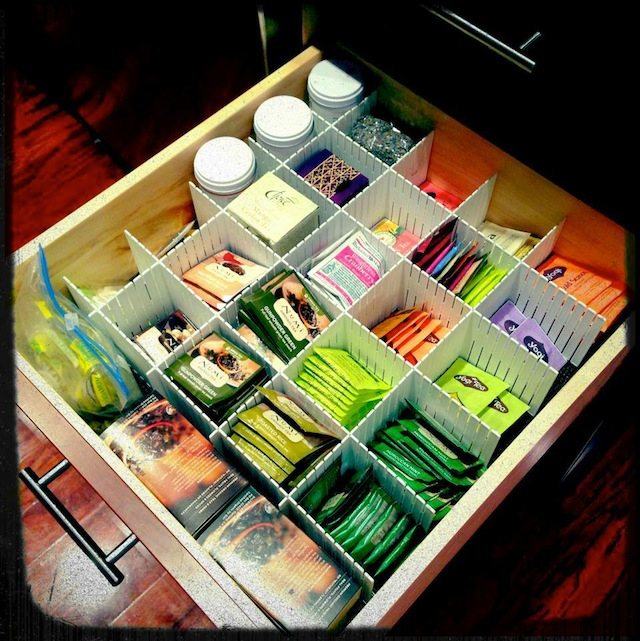 The ancient Chinese tradition of drinking tea dates back thousand of years to the early Chinese dynasties and aristocrats who drank the beverage for its medicinal properties. In ancient times, leaves from the Camellia Sinensis (the tea plant) were either ground into a powder or placed as loose leaves directly into water to infuse it with herbal essence. Unfortunately, modern day tea is nothing like the unadulterated version of old tea. Many of today’s tea brands are operating under the guise of providing health benefits and promoting clean living, but are actually laden with pesticides, toxins, artificial ingredients, added flavors and GMOs.
The ancient Chinese tradition of drinking tea dates back thousand of years to the early Chinese dynasties and aristocrats who drank the beverage for its medicinal properties. In ancient times, leaves from the Camellia Sinensis (the tea plant) were either ground into a powder or placed as loose leaves directly into water to infuse it with herbal essence. Unfortunately, modern day tea is nothing like the unadulterated version of old tea. Many of today’s tea brands are operating under the guise of providing health benefits and promoting clean living, but are actually laden with pesticides, toxins, artificial ingredients, added flavors and GMOs.
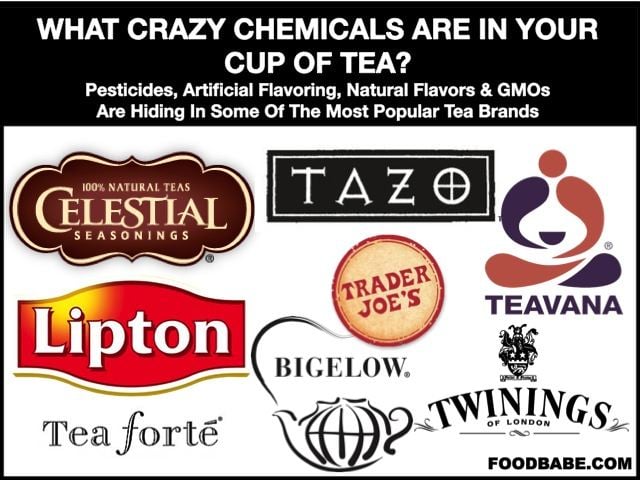
Conventional Teas – An Abundance of Pesticides
Did you know that most tea is not washed before it is put it into bags? That means if the tea was sprayed with cancer-causing pesticides, those pesticides go directly into your cup. And this is the reason why tea is on my organic shopping priority list. To prove this point, here are some shocking facts about one of the most well-known tea brands – Celestial Seasonings.
A recent third-party analysis by Glaucus Research and discussed here found that 91 percent of Celestial Seasonings tea tested had pesticide residues exceeding the U.S. limits. For example, Sleepytime Kids Goodnight Grape Herbal contained 0.26 ppm of propachlor, which is a known carcinogen under California’s Propsition 65.
The “Wellness” tea line was found to contain traces of propargite, also a known carcinogen and developmental toxin. The FDA has already issued two warning letters to Celestial Seasonings in regard to poor quality control according to this source. Imagine what happens when pesticide-laden tea is steeped in boiling water.
If grocery store brands don’t provide a clean option for you, perhaps a high-end loose leaf tea would circumvent some of the issues of grocery store brands. Right? Wrong! Take Teavana, which is found in malls across North America for example. Teavana taps into tea culture with the “Teavana Experience.” Convincing their employees to take customers on a sensory journey – they open a huge canister of loose leaf tea and wave the top of the canister so you can smell the tea – touting all of the wonderful health benefits of tea complete with samples and manipulative demonstrations that end in an expensive visit to the tea shop. Is all the extra money worth it? Are customers getting a superior tea product? No.
Teavana tea was tested by an independent lab and 100 percent of it was found to contain pesticides. One tea in particular, Monkey Picked Oolong, contained 23 pesticides. 77 percent of the teas would fail European Union pesticide import standards, and would be banned from import. 62 percent of the teas tested contained traces of endosulfan, a pesticide that has been banned by the U.S., China, the E.U., and 144 other countries because it has been linked to impaired fertility and could harm unborn babies.
UPDATE (May 27, 2014): Glaucus Research funded the research done by Eurofins Scientific (an independent lab) and admits on their disclaimer that they are biased because they would make money if Hain’s stock declines. However – I am not sure that Eurofins’ research should be completely discounted on this point alone. Since I wrote this post, Celestial has been sued in a class-action lawsuit based on the pesticides that Eurofins found in their teas and for mislabeling of them as “100% Natural”. The jury is still out on whether Eurofins’ research will be considered legit, as this case is still active in California. The Plaintiffs contend that Celestial’s teas contain “pesticides, herbicides, insecticides, carcinogens, and/or developmental toxins (collectively, “Contaminants”)” and Celestial “did not dispute – and has never disputed – that the tea Products contained Contaminants. Nor has (Celestial) challenged the results of the Eurofins Tests” and “has not claimed that Eurofins was biased or that the Eurofins Tests were not, in fact, accurate”. Even if it is determined that Eurofins’ research was not accurate – it’s important to note that Celestial’s tea that was tested is NOT organic and some of this tea is sourced from China. Greenpeace issued a report on the alarming amount of pesticides found on tea from China, followed up by a detailed report on Lipton brand tea from China – in which they recommend only purchasing certified organic tea to avoid these pesticides. Reference law documents: Complaint; Plaintiff’s Memo in Opposition to Motion to Dismiss. Case 8:13-cv-01757-AG-AN
Teas Can Contain Artificial Flavoring, Natural Flavors, and Hidden GMOs
Furthermore, a majority of Teavana teas contain added flavor – specifically “artificial flavoring.” If their tea is so high end, why would they be adding ingredients produced by fractional distillation and chemical manipulation of various chemicals like crude oil or coal tar? Coal tar in my tea? No, thanks.
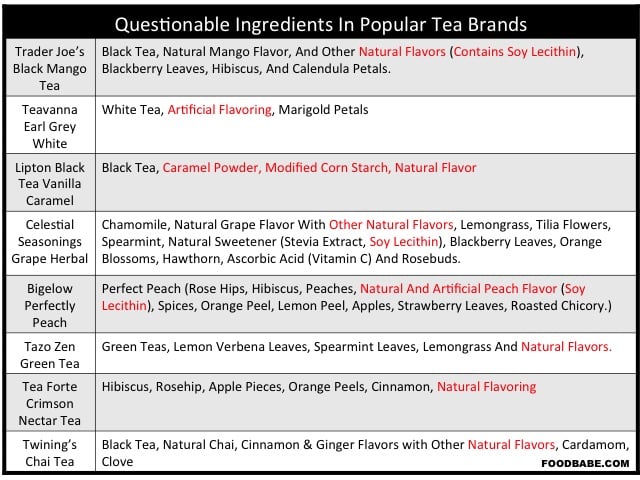
Many popular tea brands get away with using the ingredient “natural flavors” to trick the consumer into thinking they are buying better, cleaner ingredients; however companies are just covering up the inferior taste and low quality of their tea. Fortunately, there are brands that are putting the kibash on the use of natural flavors and using all real ingredients. I was happy to learn that Ahmed Rahim, CEO of Numi Tea is just as disgusted by this ingredient as I am. He said to me “You can breakdown anything that is found in nature and if it ends up tasting like the flavor you wish to use – you can add it to any product and call it NATURAL FLAVOR on the ingredient label. It could come from a stone in the ground and you’d never know.” This is why when I see the words “natural flavor” listed on a label – I put the product down and run far far away. I want to know what I am eating! Don’t you?
Additionally, the added risk of consuming possible GMOs is not something many people think about when consuming teas. Before this investigation and witnessing tea companies using modified corn starch and soy lecithin in tea (additives likely made from genetically engineered corn and soy), I didn’t think about it either! I can’t imagine having a serious soy allergy, considering all the places companies try to hide it.
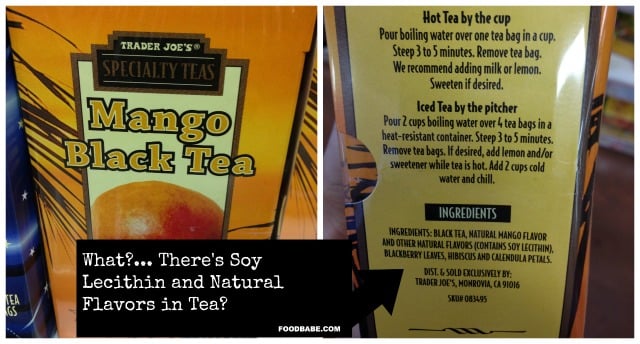
Why The Tea Bag & Packaging Matters
A recent article in The Atlantic discusses the “silky sachet” and “luxurious mesh bags” that hold loose leaf teas (like in brands Tea Forte and Mighty Leaf). Turns out, these modern day bags meant to showcase the tea leaves, are made of plastic.
PLA (polylactic acid) is a (likely GMO) corn-based tea bag material that has attracted major tea companies due to its nice look and its claims of biodegradability. Terms like “silky sachets” and “corn-based biodegradable tea bags” mislead customers into believing a product is more natural and sustainable than it really is. While the processing for PLA removes all traces of genetic material, it is still made with genetically modified corn. Although the actual tea bag is not an ingredient like teas and herbs, it is an element that is put into boiling water.
According to The Atlantic, tea bags are most commonly made from food grade nylon or polyethylene terephthalate (PET) which are two of what’s considered the safest plastics on the scale of harmful leaching potential. However, Dr. Mercola disagrees, he states:
“While these plastics are generally considered among the safest in terms of leaching potential, the molecules in these plastic tea bags may still in fact break down and leach out when steeped in boiling water…” Well, isn’t that how tea is prepared?
Another temperature consumers need to worry about in tea is the “glass transition” temperature. Here’s the science behind the glass transition temperature or, Tg, and why it becomes dangerous according to The Atlantic:
“That is the temperature at which the molecule in certain materials such as polymers begin to break down. As a rule, the Tg of a material is always lower than the melting point. In the case of PET and food grade nylon (either nylon 6 or nylon 6-6), all have a Tg lower than the temperature of boiling water. For example, while the melting point of PET is 482 degrees Fahrenheit, the Tg is about 169 degrees. Both nylons have a lower glass transition temperature than PET. (Remember that water boils at 212 degrees.) This means the molecules that make up these plastic tea bags begin to break down in hot water.”
So, while the plastic itself won’t melt in your tea, the glass transition temperature could potentially leak out harmful phthalates if there are such things in your tea. Another thing to worry about is that some of the newer tea bags are made with a variety of plastics. Some plastics are nylon, some are made of viscose rayon, and others are made of thermoplastic, PVC or polypropylene.
Beware of paper tea bags too, which can be worse than plastic tea bags.
GET THIS: Also according to Dr. Mercola, many “paper tea bags are treated with epichlorohydrin, a compound mainly used in the production of epoxy resins. Considered a potential carcinogen by the National Institute for Occupational Safety and Health2 (NIOSH), epichlorohydrin is also used as a pesticide. When epichlorohydrin comes in contact with water, it hydrolyzes to 3-MCPD, which has been shown to cause cancer in animals. It has also been implicated in infertility (it has a spermatoxic effect in male rats) and suppressed immune function.”
So what do you do the next time you want a cup of tea? Antioxidant rich teas aren’t going to do much to counterbalance the chemicals, additives and artificial flavorings in today’s modern teas.
First, I recommend looking at this chart below to see how your favorite tea brand stacks up:
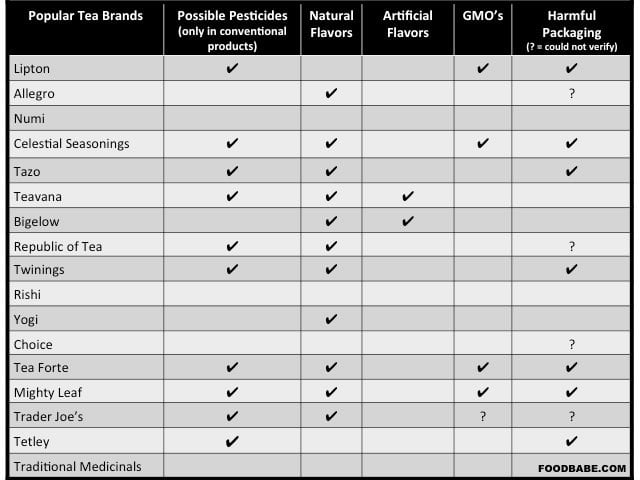
And then when brewing and picking out the safest tea remember these tips:
1. Choose an organic & non-GMO certified brand of tea. (My favorites are Numi, Traditional Medicinals, and Rishi Tea (loose leaf)).
2. Check the ingredient list on the back of the tea package to make sure there are no added flavors, GMO ingredients like soy lecithin and corn starch added to the tea leaves.
3. Make sure the brand you buy uses a safe form of packaging material or buy loose leaf tea and use a stainless steel or glass tea strainer. Have the company verify that bags do not contain epichlorophydrin, and avoid plastic tea bags all together. (Numi and Traditional Medicinals are some of the only brands I trust in this category because they have publicly stated they do not use this harmful ingredient or GMO packaging and are Non-GMO Project verified.)
4. The majority of restaurants use some of the most pesticide ridden tea and brands that have harmful packaging like Celestial Seasonings, Lipton, etc. Don’t fall victim to this. Bring your own tea when eating out or going to restaurants and ask for pot or cup of boiling water (remember to leave a good tip if you do this). I even do this at Starbucks because I like to vote with my dollars and not buy tea brands that are harmful. If you drink iced tea, brew your own at home and carry an insulated water bottle with you.
5. Remember these temps and times for brewing the perfect cup of tea
If you know someone who loves to drink tea, please share this post with them. I was just as shocked as you probably are about all of this craziness – knowing what’s in our tea and what we put in our body matters! Let’s change the world together.
Xo,
Vani


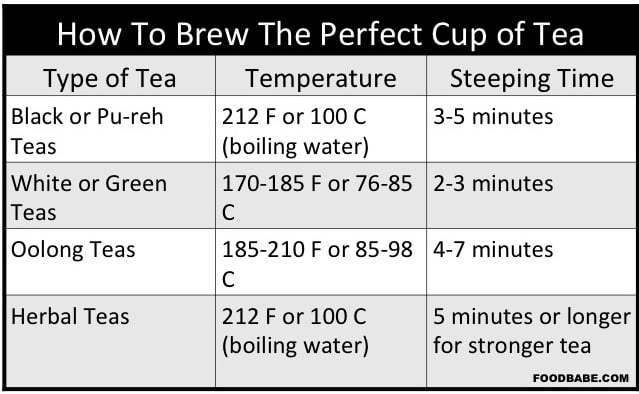

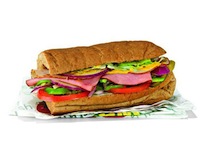
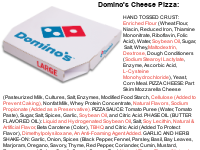
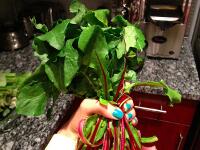


If I am drinking tea, all I want in it is tea, period. I don’t care about so called acceptable levels of poisons and GMOs. No thanks.
What do you think about Runa tea?
Hi. Here in the south, we drink a lot of sweet, iced tea. Your information was about the individual serving of hot ‘fancy’ tea. What do you suggest for us iced tea lovin’ folks?
Thanks!!
I was wondering about iced tea as well. I am positive that the tea bags I use are not organic. Also, I use an iced tea maker….plastic of course. That is my next target to find a way to make iced tea that is not toxic.
I boil a half gallon of water, add 8 black teal bags, brew for 4-5 minutes, add sugar, then cool in the fridge! 🙂
Me too! That has been on my heart and mind for awhile now, so i lessened the amount we drink weekly and have to find a whole new approach! But went back to using a kettle a few years back…that’s one victory won =)
My husband is from the south and drinks about a 1/2 gallon of sweet tea a day. Thankfully I have convinced him to cut way back on the sugar if he’s going to drink that much but now I’m worried about the tea itself. Would love to know of an affordable and safe brand that we can get in California that he could use to make his iced tea!
Have you ever heard about the only tea plantation here in USA? It is the Charleston Tea Plantation on Wadalow Island . You can get it at or also get SC tea in Piggly Wiggly that supportds the environment . Both are excellent for Sweet tea and are quality black tea. http://www.charlestonteaplantation.com/About-Us.aspx
My son and I went to Charleston in October of last year. We learned of the Charleston Tea Plantation on a tour. I actually bought a couple of boxes in the gift shop at the Angel Tree. I wish we had a Piggly Wiggly in Charlotte, NC.
ps..The Angel Tree is breath taking!
How about Davidsons organically teas and India organics? Both are certified organic teas. Is the certified organic label not enough to assure you are getting a good product?
Nothing is 100% organic. Lets just start right there. Calling something organic does NOT mean that they do not use pesticides or that their product does not contain any pesticides. The term organic is a misnomer, it is really more of a stipulation on whether or not the company meets certain standards. However those standards are not very strict. The term is a ruse to affect a false sense of security. Do “organic” items have less chemicals, yes, but they are NOT chemical free.
Hi, I was reading this blog and then saw an episode of Market Place that addressed this issue. Some of you will be glad to know the Red Rose Orange Pekoe had the best rating.
This it the blog but you can also watch the episode online.
http://www.cbc.ca/marketplace/blog/tea-companies-respond
I am happy to hear that. My mom drinks at least 6 cups per day and wanted to get her on to some kind of organic tea, but she has drunk Red Rose for her whole life. I’m happy its one of the safer ones, albeit not organic. I wonder about those tests though….it says Red Rose has absolutely zero pesticides. Is that even possible?
I wonder if you know that organic also uses pesticides.
red rose black pekoe is my go to tea glad to hear it is one of the safest THANK GOD
Thank you food babe so much for this information on tea!! I was wondering if you have looked at what’s in bags of ground flavored coffee that you buy at grocery stores? They do not contain an ingredient list.
What is the best way to boil water for tea? I have been drinking more tea lately and just use a pot. I was thinking about getting an electric tea kettle or just a regular one. Any thoughts?
Electric kettles boil the water MUCH faster and use a lot less energy. I’ve also heard people say that the electric kettle’s speed allows more oxygen to remain in the water. the more oxygen in the water, the better your tea brews….or at least that’s what the Brits say.
I only drink loose tea that I buy from a reputable local tea shop who is very careful about where she gets her teas. I never knew loose tea was so awesome until I learned how to brew it correctly and there are awesome new tools that make it super easy.
I live in Hong Kong and I think the best way maybe the Chinese way, they always pour away the first water and then start drinking the second one. They always warn you about that, it’s a way of washing the tea before you drink, they always say.
This should not be ignored. I almost died from pesticides on tea from China. Read about it here: http://ddormer.wordpress.com/author/ddormer/
This guy has no proof to back up his claim. No proof that his tea was tainted or even that the producer of said tea used pesticides. All he has are personal opinions & speculation.
I didn’t see Stash tea listed, I drink 2 cups of earl grey daily.
I also was wondering about Stash Tea. I don’t see soy lecithin or natural flavors listed but I wonder about pesticides and what the bag is made of. I have a loose tea brew strainer. I may cut the bag open and use that instead.
I was also wondering about Stash tea, I have the Lemon Ginger kind and when I looked closely at the label it does have “natural flavors” in some of their flavors so that could be problematic.
please refer to http://www.stashtea.com/info/FAQ_About#13
It said ” The filter paper used for Stash Tea bags is made from 100% cellulose fibers (wood). Test results conclude that chlorine dioxide is not present in our tea bag filter paper. The filter paper is not coated with the compound epichlorohydrin, and does not contain any free epichlorohydrin. Stash tea bag filter paper is machine folded and pressed, therefore no glue is needed or used.”
please refer to http://www.stashtea.com/info/FAQ_About#13
It said ” The filter paper used for Stash Tea bags is made from 100% cellulose fibers (wood). Test results conclude that chlorine dioxide is not present in our tea bag filter paper. The filter paper is not coated with the compound epichlorohydrin, and does not contain any free epichlorohydrin. Stash tea bag filter paper is machine folded and pressed, therefore no glue is needed or used.”
I am a big tea drinker. I know not to buy tea with soy lecithin and artificial or natural flavors but I did no know about all the pesticides and what the bags are made of. Thank you for the eye opening information. Keep up the good work!
What about organic Yerba Mate I know it is not a tea but is it healthy?
what happens if you steep green tea for longer than 3 minutes. And is it ok to reuse the leaves for a couple of more brews
Yes it is alright to re-steep your tea leaves. The resulting tea will not be as strong but as long as you don’t mind it shouldn’t matter.
I was wondering if you knew anything about these pots for brewing tea. They work great for tea but they are plastic. Probably leaches into the tea. I have two of them and loved to use them before it dawned on me about hot water in plastic even though it’s bpa free.
http://www.adagio.com/teaware/ingenuiTEA_teapot.html
Don’t see Ecolabs Roobios listed … which is sold very highly in health food stores and food co-op s …
This is wonderful article! Thank you for presenting the researching detail for us!
does green tea interfere with blood pressure medicine
What brand of teas are good for a detox?
Thank you so much for spreading the word on this. I think its about time the FDA revise their labeling requirements and make GMO’s mandatory.
Also, thanks for pointing out the “natural” flavors in tea. These are anything but natural and are very confusing for most people who drink tea. You think your drinking something natural, but your not. Its processed, its unhealthy and its confusing.
Great article! I’m sharing on my Facebook page.
I use this information to help my patients. Thanks for all your hard work and dedication. You are helping to change the world!
I like Zhena’s Gypsy Tea, have you done any research on that brand??
I am also wondering about Zhens’s Gypsy Tea, the Gypsy Rose particularly. It does say “all natural flavor”. even though it says USDA Organic and Fair Trade.
I love Runa tea, the fair trade Guayusa.
What about Stash Tea that is sold through the Green Polka Dot Box?
please refer to http://www.stashtea.com/info/FAQ_About#13
It said ” The filter paper used for Stash Tea bags is made from 100% cellulose fibers (wood). Test results conclude that chlorine dioxide is not present in our tea bag filter paper. The filter paper is not coated with the compound epichlorohydrin, and does not contain any free epichlorohydrin. Stash tea bag filter paper is machine folded and pressed, therefore no glue is needed or used.”
I would like to see the Alvita brand of tea mentioned. It has a Goldenseal tea that helps to fight off infections. I am also a big fan of Traditional Medicinals.
I emailed Celestial Seasonings about this report because I drink several mugs of one of their specialty teas everyday. CS referenced the issue of Glaucus Research’s gain if Hain’s stock declined. They also told me emphatically that there are no pesticide residues in their teas. A third party lab tested CS products to disclaim the pesticide residue claim.
I’m not sure where this issue stands at present but the claims made against these companies are serious enough that I feel this issue warrants a follow up post.
Having worked in the animal welfare and environmental world for many years, I’ve learned to take in all information, decipher and decode and then release it in the most even-handed way possible. I appreciate the time and effort it takes to research these issues. Research and reporting is 50% of the work. When we make or repeat allegations and certainly if we personally have something to gain by reporting them we have an even greater responsibility to follow up and retract any false claims as boldly as we initially reported them.
I look forward to reading more information from you on this subject.
Thanks for all you do to keep us informed.
Any information about organic Puka tea?
Please help bring back discontinued Numi Decaf Teas! After reading this, I stopped using Republic of Tea organic teas and switched to Numi Tea (which I had never heard of). I love decaf iced tea, which I steep in a stainless steel bowl, then transfer to a glass pitcher. I developed a decaf iced tea recipe using 13 Decaf Earl Grey bags with three bags of Decaf Black Vanilla and just a couple of tablespoons of raw sugar. Absolutely delicious and everyone loved this. NOW – Numi has discontinued both of these teas! I am devastated, because this was the best iced tea blend anyone who tried it had ever tasted. Perhaps the Food Babe Army can join in for more decaf organic black teas for iced tea. It’s so nice when you’re sensitive to caffeine.
Thanks for all the information you provide – it’s helpful. We do need to support the responsible food/beverage providers. Numi Tea is great, but need new decaf varieties or bring back the old favorites!
Why did you stop using Republic of Tea? I contacted them about their bags and this is what they said….
“Dear Citizen,
Thank you for your email. Our unbleached teabags are made from wood pulp fibers, which do not contain epichlorohydrin or plastic. They are free of chemicals, toxins and do not contain gluten, GMO’s or corn.
Sip by sip,
Minister of Citizen Services
Yes! I only use and always will use Traditional Medicinals -it’s an excellent company all free from GMOs, pesticides, and artificial garbage. I always felt weird about Teavana (garbage).
Great info! Thanks again Food Babe!
Thank you for this article! Although I have to say I am devastated by this and scared. I pretty much only drink tea – I drink it morning, noon and night – and all of the tea I have consumed is on the list. I have consumed tea since I was 5 and now I am mid-40s – ugh. I hope I did not already do irreversible damage!
Nothing is safe for consumption anymore. Corporate coffers rule and use toxic chemicals to get products on the shelf that look real but which are just mirages of real stuff – taking our money and lives in the process.
I am so angry about this situation ! People are dying of cancers and illnesses and these companies are the reason ! Just like there are tons of tea offenders on your list – there is a list for nearly every category of food / drink.
Anyone have a non toxic tea kettle/pot brand they use? Boiling water in an aluminum tea pot can’t be healthy.
I use a Breville electric tea kettle. It has several brewing options and brew temps from 160 to 212 degrees.
hi, i am from Australia so a lot of the food legislation and products are different.
We have two brands in the supermarket i rely on. But friends buy me gifts of tea. First is T2, particularly ginger, mint and lemon mixes. Does anyone know how they rate?
The second brand i love is Qi, that says organic and fair trade, but it comes in tea-bags. I don’t drink that much of this tea.
I would love to hear more about T2, which is big here in Australia.
Thanks for any information in advance
What about Luzianne black tea?
THANKS FOR YOUR RESEARCH. I AM CLEANING OUT MY TEA CUPBOARD TODAY!! I APPRECIATE YOUR WORK AND YOUR HELP WITH BEST HEALTH PRACTICES AND WILL FOLLOW YOU.
Do you consider fluoride levels in all teas? Is this a fact or myth that teas retain a large amount of fluoride?
To Food Babe: I have not read all the comments here but I am wondering about your thoughts on Adagio Teas. I found their store in Naperville, IL and found the staff to be very knowledgeable. I have been drinking their teas for a couple years. Using their heat pot and system to brew. Can you check on this and give a little info?
Paula
I also use and love Adagio teas. I started out with Teavana but grew frustrated with their high prices and the fact that everything has artificial flavoring. Though, I am pretty sure when I very first bought from them such ingredients were not listed. So not sure what happened there. But I love my Adagio and would be interested to see where they fall on that chart.
Vani,
Love what you are doing!!! I drink a lot of tea by Organic India and Ananda’s ShanTea. They seem pretty clean as far as flavorings. I have been on the look out for that for a while now but never thought of the bag it’s self being an issue. Thank you for bringing that to our attention. I would love to have you add these two company’s to your list and would love to know if they are using harmful bags.
Keep up the great fight on the GMOs! Allison
steeped tea is certified organic whole leaf tea!
http://www.mysteepedteaparty.com/KT201066/
I recently came across a tea company called Prince of Peace Tea. They claim to be 100% organic. I was wondering if you have heard anything about them?
All this talk about pesticides is great, but why no mention of fluoride in tea? from what I have read, fluoride mimics thyroid hormone and blocks the receptors and thus hinders the hormone’s reception to the thyroid gland.
This is why I make my own loose leaf tea blends! This is also why I became a Cottage Baker and sell my teas locally!
Ugh – SO very disheartening reading this post and being an avid tea drinker. I guess I had some idea, but a lot of the info that came to light after reading this is nothing shy of disturbing 🙁 !!!
I’ve been drinking David’s Tea as I thought it was a much better, healthier option… although reading about Teavana, sounds like a very similar experience with David’s. Does anyone have any input on them? Any light shed would be greatly appreciated 🙂 Thanks!!
I actually agree with what most of what she is saying because I have thoroughly reasearched myself. Being a tea lover. However it does surprise me, Foodbabe, that I have only seen you respond once out of all of these comments. Or did I miss something?
Hello,
Thank you for this website and all your great information. I must say I am jealous at the high end resorts/places you travel too, I will never afford those places 🙂
I am from Canada and CBC Marketplace opened my eyes to “bad” teas and then I stumbled onto your website and now it’s my go to site now. I recommend your site to everyone. I have thrown out all the bad teas. Is Yogi tea ok, not much written here but it is in your “drawer” picture.
Thanks, Barb
I don’t mean to be rude, in fact, I respect that you try to offer good information to your readers about what they eat to help them take charge of their food choices.
However, I was just a little confused. Yes, some Bigelow teas have soy flavoring in them, I’ve read that on the label, but others don’t like their peppermint tea, but on that same chart, you do not have a checkmark to indicate that its tea packaging is harmful. However, later on this page, you say,
“The majority of restaurants use some of the most pesticide ridden tea and brands that have harmful packaging like Celestial Seasonings, Lipton, Bigelow, etc.”
Now when you mention the Bigelow brand teas in this sentence do you mean to refer to the earlier part of the sentence, that it is “pesticide ridden” or do you mean that its packaging can harm health? Because if you wished to indicate in this sentence that Bigelow tea is packages so as to harm health, that would be the opposite of what you had indicated on the chart.
P.S. have you researched Stash teas by any chance? They are not mentioned in this tea survey.
– Tea aficionado
P.S.S. there is a Saint Dalfour (or Balfour, can’t remember) black cherry tea available from Vitacost. Have you ever tried it, and if so what did you think of it?
What about Taylors of Harrogate – Yorkshire GOLD tea. It is my favorite black tea.
It’s quite pricey compared to Lipton’s Tea which tastes like crap…
Have tried the Emperor Green tea and Mint Teavana teas at Starbucks in the past week…bad allergic reactions to both, wheezing, difficulty breathing, headaches.
Have NEVER experienced an allergic reaction to any other brand of tea before! Do have food allergies, but green tea and black teas have always been ok. Wanted to share in case others have experienced similar reactions. Downright scary.
I’m done with Teavana. Two cups and done.
Thank you FoodBabe for a great article!
Your misuse of the glass transition temperature of plastic is completely out of line. Please remove this passage as it is incorrect and misleading. The glass transition temperature does not cause the polymer to “break down”, it is when the material begins to soften and the plastic becomes rubbery. At this point, the molecules are still whole and technically still in a solid state. The PET plastic and low level of plasticizers in most of these tea bags is the least of your worries. You should be more worried about what companies are adding to the actual tea.
At the very least, this section detracts from your entire article and at the very least it shows that you are commenting on something you do not understand fully.
FYI, I’m an engineer who works with plastics.
Horrifying. My children and I drink multiple cups of tea every day. I am appalled to realize I blindly fell for some of the tricks of the industry (especially considering how much money I recently spent at teavana). Thank you for doing this research. Numi will be getting my business from now on.
I choose brands of loose tea such as The Octavia Tea company , the loose leaf on Etsy, or Welsh brew (Paned Gymraig) or I buy my tea loose at a local tea shop from big apothecary jars. I never use strainers I always make pots. the left over tea I chill for iced tea. when I do use bags, I circumvent the tea leaf all together and make rooibos rocks tea. their Facebook page is how I found about this blog.
I try and ignore almost all of the teabags and look for loose tea. If it has anything I cannot pronounce or “hidden flavorings” forget it! back on the shelf it goes.